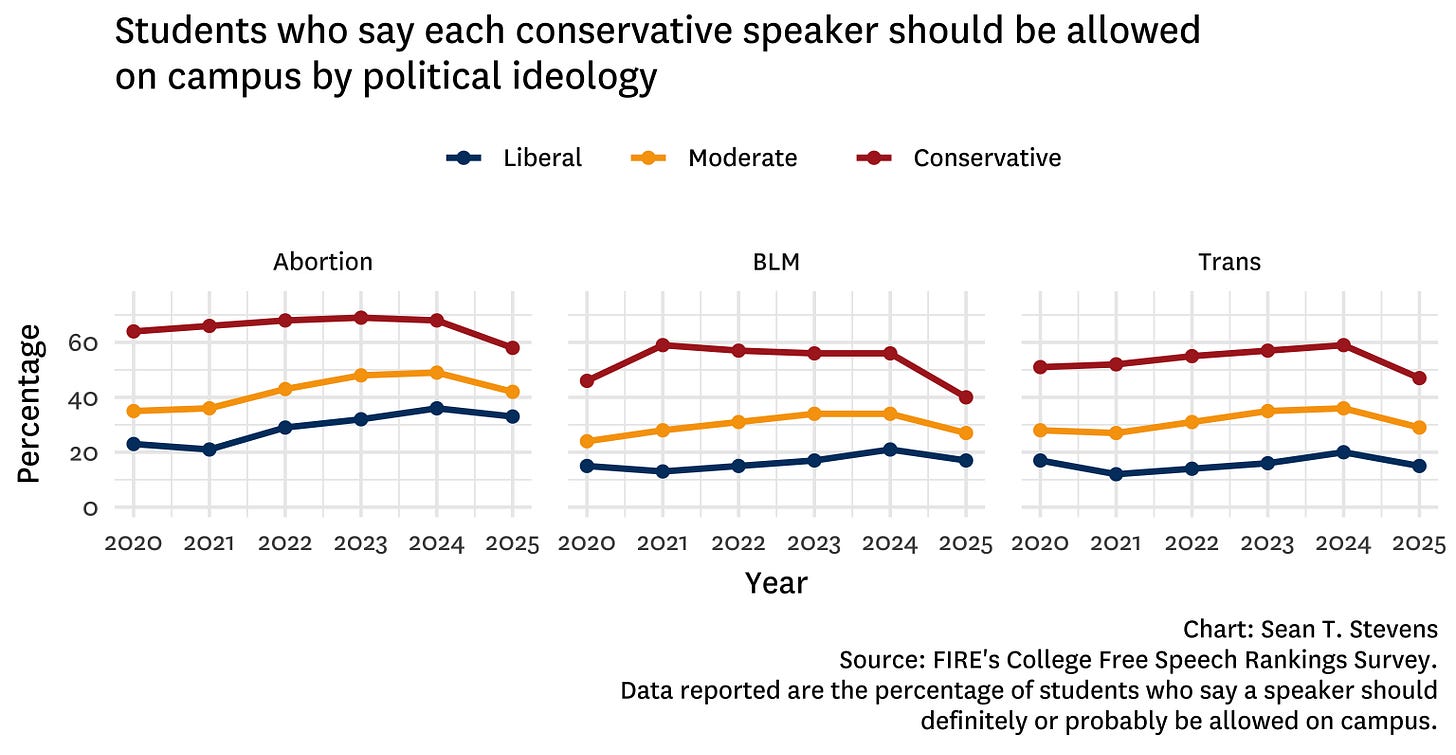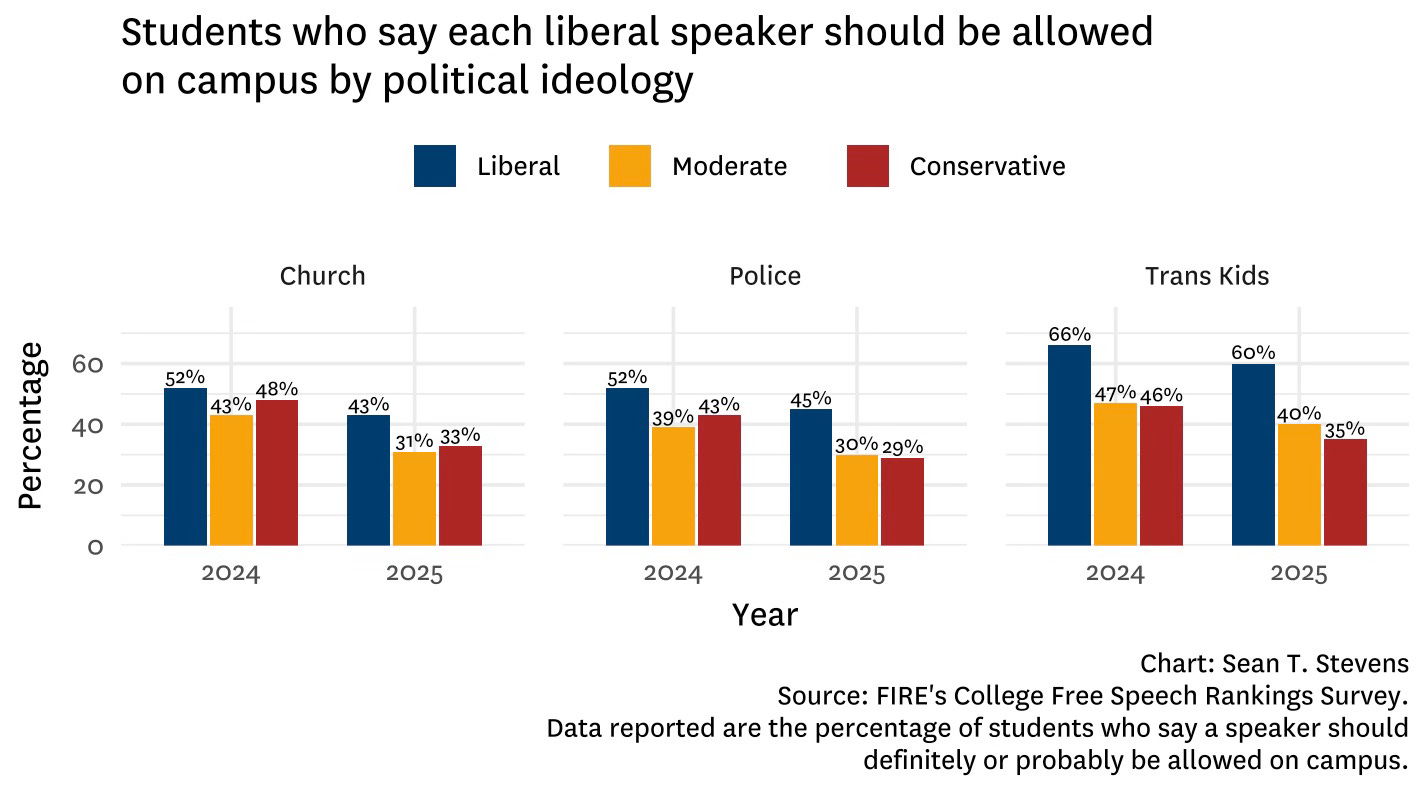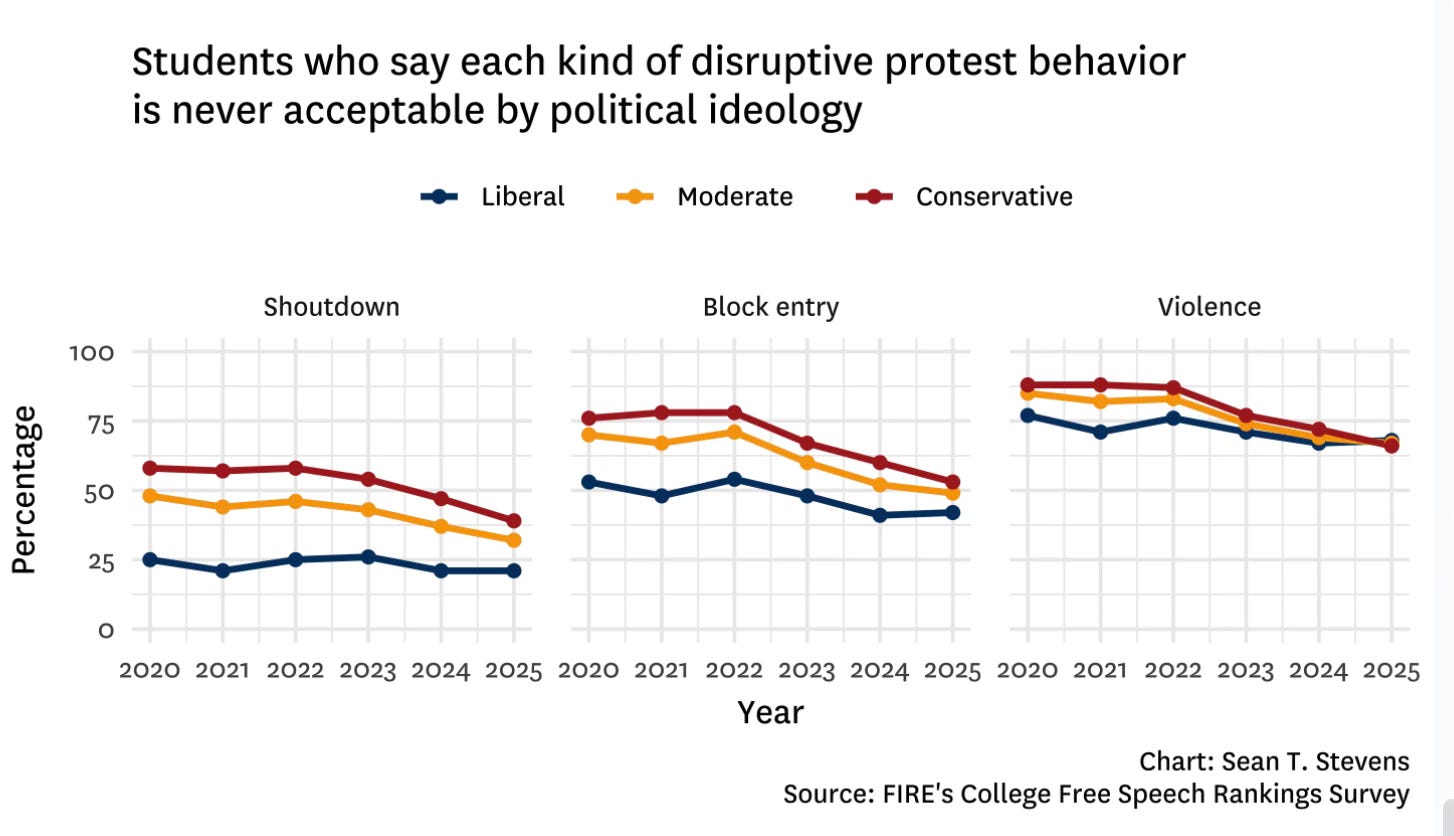For years, most efforts to silence controversial speech on campus came from the left, but new data reveals a startling shift. Increasingly, these efforts are coming from the right — frequently with federal backing.1
Looking at FIRE’s Scholars Under Fire and Students Under Fire databases, Heterodox Academy senior researcher Shiri Spitz Siddiqi found that, while censorship attempts from the left have declined, efforts from the right have gone up. Data from FIRE’s College Free Speech Rankings over the past six years, including the forthcoming 2026 College Free Speech Rankings, supports these findings.
That said, this year’s spike in efforts from the right, targeting scholars, is largely due to a single event: the Naval Academy’s removal of 381 titles from its library, per a Pentagon directive tied to the Trump administration’s DEI rollback. Most of the titles are by authors who qualify as scholars for FIRE’s database, and almost all were reshelved by late May, after public blowback.2
A similar incident recently took place at George Mason University, where all 55 members of the faculty senate have been placed under investigation by the federal government for drafting a resolution in support for Gregory Washington, the university’s president, who is also under federal investigation for allowing the university to allegedly engage in discriminatory diversity programs.3
This trend is profoundly disturbing, especially given that both these incidents were the direct result of federal government pressure or intervention.
In FIRE’s CFSR survey, students are asked if their school should allow a speaker on campus who has previously expressed a controversial opinion. The survey then lists the following opinions, one at a time, in a randomized order:
Abortion should be completely illegal.
Black Lives Matter is a hate group.
Transgender people have a mental disorder.
The Catholic Church is a pedophilic institution.
The police are just as racist as the Ku Klux Klan.
Children should be able to transition without parental consent.
This year, for the first time ever, at least half the students surveyed oppose allowing any of the above controversial speakers — primarily due to a drop in tolerance among conservative students for the three conservative speakers.
Each year, we’ve also asked students if they would support or oppose allowing controversial speakers on campus, and whether they think it’s acceptable for other students to disrupt a campus speech by shouting down a speaker, blocking entry to the event, or using violence.
The percentage of students saying that it is “never” acceptable to engage in such behavior are all at record lows and, as with political tolerance, this is primarily due to a decline in conservative students who say each behavior is “never” acceptable.
In other words, the vibe shift in campus censorship is real, and free expression is now under threat from both sides.
If American higher education’s commitment to academic freedom is to mean anything, it must defend it against censors of every stripe — especially when that censorship carries the weight of federal power.
To be clear, “from the left” means that even if a controversial student or speaker was on the left themselves, they were more likely to be targeted by someone further to the left than by someone to their political right.
FIRE defends individual rights, therefore we count each scholar as an individual entry, resulting in 111 of the 151 entries recorded in 2025 so far — and we’ve only reviewed about a third of the titles on the list for removal.









“FIRE defends individual rights, therefore we count each scholar as an individual entry, resulting in 111 of the 151 entries recorded in 2025 so far — and we’ve only reviewed about a third of the titles on the list for removal.”
Wow, what a cheap, dishonest way to claim that censorship from the right is up relative to the left.
Almost all past FIRE reporting has been about incidents of censorship.
But now you claim that the removal of a particular book from a library is a separate attack on a specific *scholar*?!?!? 🙄
Please.
Are you *really* claiming that you have reviewed the entirety of all past FIRE reporting and verified you held it to the same standard of “individual” rights in your counts?
I would be extremely surprised to find that that is the case.
By that logic, does that mean you counted the individual students who planned to attend and were denied their right to access to a given speaker when a speaker was not allowed to speak?
Of course you did not make such an impossible count.
Of course If you did, the claims of “balance” in censorship attacks on students up through 2024 would be preposterous.
Do you truly not see the double-standard in counting and presenting the censorship incidents from each side?!?
So by your logic, had there been 300 members of the GMU faculty Senate that would have been 300 incidents of attacks from the right instead of 55 (or the *correct* view, which is ONE incident of a particularly disturbing attack)? 🙄
For the rest of us who don’t want to have to spend the time to review each and every prior FIRE incident case, can you show us your work, or tell us when the “policy” about each book counting as an individual instance of censorship was made FIRE’s practice? Does this go back to early in the organization’s founding? Because it sure smells like a way to put the thumb on the scale…
And/or you are not reporting that in fact you count attacks against students’ rights to be free from censorship by having speech denied to them differently from “scholars”.
Lies, damn lies and statistics I guess.
This counting of books removed as “incidents”, and of multiple faculty in a faculty senate each as separate “incidents”, is an indefensible double standard clearly done by motivated staff trying to show that the censorship on campus from the right has been close to equal that from the left.
My suspicion is that there's two key factors going on here.
1. Culture war exhaustion. Regardless of one's position on any of these 6 hot button topics, there's an awareness that a prominent guest speaker speaking on it is likely to bring a lot of chaos and disruption and heated divisions to their college. Likely a lot of students simply don't want *the fallout* from people speaking on these topics, regardless of their position on the topic itself.
2. "What's good for the goose is good for the gander." Many conservatives feel like being free speech absolutists just leads to them getting the worst of both worlds - their political rivals get to take advantage of their free speech principles while many of their political rivals *also* get to shut down unwanted conservative speech.
An analogy I would use here is a game of sports. Think of uniform free speech absolutism being similar to a ref consistently calling the game with a lot of leeway for both teams - only the most flagrant of violations get penalized. Now, think of Team A enjoying such leeway while the other team (Team B) has the rulebook called very strictly on them. This is obviously to Team B's disadvantage, regardless of how the players feel about how strictly the rules should be followed in an universal sense. "If they refuse to not be strict on our team, then we need to convince the refs to be strict on *both* teams."
Sadly, I think the fight for free speech is going to get increasingly hard in the years to come, as both of the factors I mentioned will play on the minds of many conservative and right-leaning people.